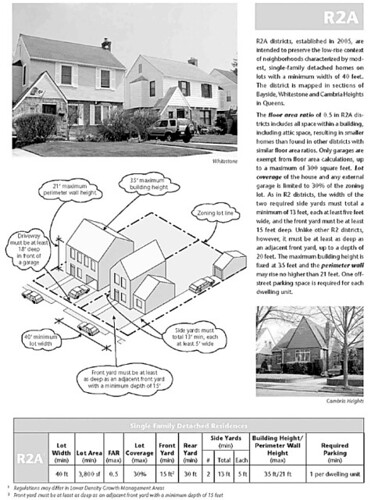Happy anniversary, zoning!
From Zoning at 85 by Ed McMahon, in Urban Land Magazine:
This year marks the 85th anniversary of the landmark United States Supreme Court case Euclid v Ambler Realty, which upheld the basic constitutionality of local zoning. Given the current debate between liberals and conservatives about the appropriate role of regulation in shaping our economy and our communities, it seems timely to ask the question: do we still need zoning?
Some anti-government activists argue that we don’t need zoning and that land use planning is somehow akin to socialism. In fact, planning is the multi-faceted process that communities use to prepare for change. It is an activity as old as humankind itself. In most realms of endeavor, failing to plan, simply means planning to fail. Try to imagine a corporation without a business plan. It would have a hard time attracting investment. The same is true of communities. In America, land use planning is primarily the responsibility of local government. Zoning is considered the quintessential tool of plan implementation.
A zoning ordinance divides a local government’s jurisdiction into districts or zones. For each district or zone, the zoning ordinance regulates the type of land uses allowed, intensity or density of development, height, bulk and placement of structures, amount and design of parking, and a number of other aspects of land-use and development activity. ...
Despite criticism from some academics and property rights advocates, zoning has stood the test of time.
Does this mean that every zoning decision made by a local planning commission is a good one or that zoning has produced the beautiful, high quality living and working environments that we all care about? No – zoning has not always lived up to its promise and it has sometimes been misused. For example, in some places zoning has been used to exclude low-income families or to keep out minorities. In other places, zoning has been used to give every landowner exactly what they want regardless of the cost to the community or the impact on neighboring landowners. Want to build a shopping center in a flood plain or a racetrack next to a residential area? No problem – we’ll just rezone the property.
Zoning is merely a tool. It is a means to an end. It can be used constructively as a positive force for community good or it can be misused. Zoning is what you make of it. It works best when it is based on a community vision and closely tied to a comprehensive plan. At its best, zoning can provide the marketplace with predictability and certainty. It can protect critical natural resources and it can raise property values. However, by itself, conventional zoning will rarely create a memorable community.
This is because conventional zoning is a limited tool. It is good for protecting what is already there and for preventing nuisances. It is not as good for shaping the future or for improving the quality of new development. This is because most zoning codes are proscriptive in nature. They try to prevent bad things from happening without laying out a vision of how things should be.
Successful communities think beyond conventional zoning. They use education, incentives and voluntary initiatives, not just regulation. They also use design standards, form-based codes, density bonuses, transfer of development rights and other innovative techniques that foster walkable, mixed use neighborhoods.

Page from the New York City Zoning Handbook.
Labels: land use planning, sustainable land use and resource planning, urban design/placemaking, zoning



0 Comments:
Post a Comment
<< Home